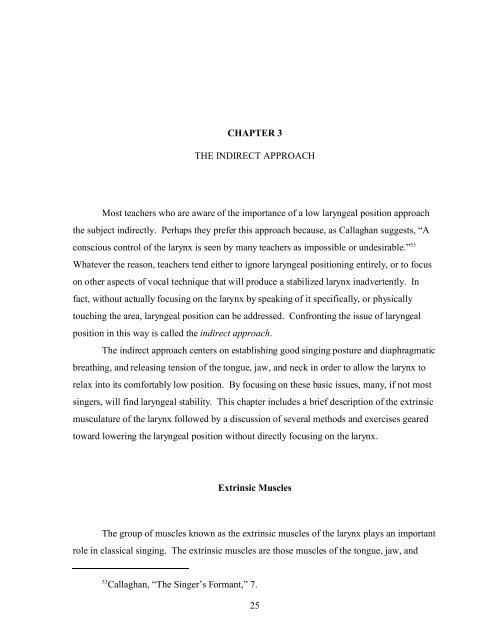THE FLORIDA STATE UNIVERSITY COLLEGE OF MUSIC THREE ...
THE FLORIDA STATE UNIVERSITY COLLEGE OF MUSIC THREE ...
THE FLORIDA STATE UNIVERSITY COLLEGE OF MUSIC THREE ...
You also want an ePaper? Increase the reach of your titles
YUMPU automatically turns print PDFs into web optimized ePapers that Google loves.
CHAPTER 3<br />
<strong>THE</strong> INDIRECT APPROACH<br />
Most teachers who are aware of the importance of a low laryngeal position approach<br />
the subject indirectly. Perhaps they prefer this approach because, as Callaghan suggests, “A<br />
conscious control of the larynx is seen by many teachers as impossible or undesirable.” 53<br />
Whatever the reason, teachers tend either to ignore laryngeal positioning entirely, or to focus<br />
on other aspects of vocal technique that will produce a stabilized larynx inadvertently. In<br />
fact, without actually focusing on the larynx by speaking of it specifically, or physically<br />
touching the area, laryngeal position can be addressed. Confronting the issue of laryngeal<br />
position in this way is called the indirect approach.<br />
The indirect approach centers on establishing good singing posture and diaphragmatic<br />
breathing, and releasing tension of the tongue, jaw, and neck in order to allow the larynx to<br />
relax into its comfortably low position. By focusing on these basic issues, many, if not most<br />
singers, will find laryngeal stability. This chapter includes a brief description of the extrinsic<br />
musculature of the larynx followed by a discussion of several methods and exercises geared<br />
toward lowering the laryngeal position without directly focusing on the larynx.<br />
Extrinsic Muscles<br />
The group of muscles known as the extrinsic muscles of the larynx plays an important<br />
role in classical singing. The extrinsic muscles are those muscles of the tongue, jaw, and<br />
53<br />
Callaghan, “The Singer’s Formant,” 7.<br />
25
















